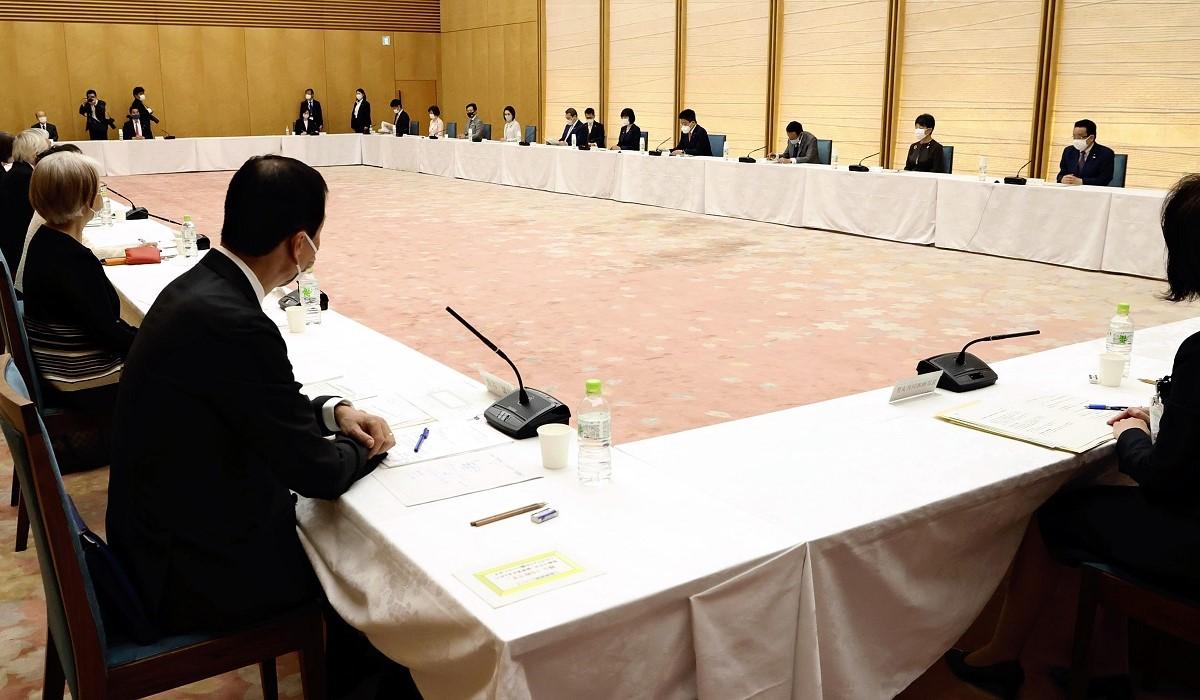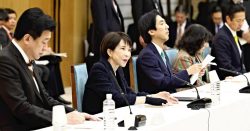
A meeting of the Gender Equality Council is held at the Prime Minister’s Office in April 2021.
1:00 JST, June 6, 2023
The government has set a goal for large Japanese companies to have at least 30% of their executives be women by 2030, according to a draft compiled by the Gender Equality Council.
The goal applies to companies listed on the Tokyo Stock Exchange’s Prime market. The government is aiming to create momentum toward women being promoted more broadly.
The draft is for a key policy aimed at encouraging women’s participation in the labor force and improving gender equality. It will be reflected in the Basic Policy on Economic and Fiscal Management and Reform, to be adopted by the Cabinet by the end of the month.
The draft states that private companies in Japan are “lagging far behind internationally” in the promotion of women to executive positions.
Now that investors in Japan and abroad are increasingly looking at gender ratios for company executives, “It is urgent for these firms to accelerate the promotion of women to executive posts for the growth of the Japanese economy,” the draft notes.
As a specific measure, the council is requesting that companies listed on the TSE’s Prime market appoint at least one female board member by 2025. It has also called for action plans to ensure that at least 30% of executives at each company are women by 2030.
In order to ensure the plans’ effectiveness, the council will arrange with the TSE to incorporate these goals in the TSE regulations by the end of this year.
As for gender pay disparities, it became mandatory in 2022 for companies with 301 or more employees on a regular basis to disclose relevant information. The draft includes a plan to explore expanding this to companies with 101 to 300 employees.
To ease the burden of child-rearing on women, the council also stressed the need to have more men take childcare leave and to entrench the concept of dual-income couples sharing in child-rearing labor.
The draft also stipulates the establishment of a benefits system to ensure that take-home pay will not be reduced when parents with children under 2, regardless of gender, work shorter hours.
As one of the TSE’s three segments, the Prime market is for large companies that operate internationally, while the Standard market is for businesses that mainly operate domestically and the Growth market is for emerging companies. Listing criteria for the Prime market are the strictest among the three segments, requiring companies to have stocks with a tradable share market capitalization of at least ¥10 billion. As of Friday, there were 1,835 companies listed on the Prime market.
Top Articles in Politics
-

Japan PM Takaichi’s Cabinet Resigns en Masse
-

Sanae Takaichi Elected Prime Minister of Japan; Keeps All Cabinet Appointees from Previous Term
-

Japan’s Govt to Submit Road Map for Growth Strategy in March, PM Takaichi to Announce in Upcoming Policy Speech
-

LDP Wins Historic Landslide Victory
-

LDP Wins Landslide Victory, Secures Single-party Majority; Ruling Coalition with JIP Poised to Secure Over 300 seats (UPDATE 1)
JN ACCESS RANKING
-

Producer Behind Pop Group XG Arrested for Cocaine Possession
-

Japan PM Takaichi’s Cabinet Resigns en Masse
-

Man Infected with Measles Reportedly Dined at Restaurant in Tokyo Station
-

Israeli Ambassador to Japan Speaks about Japan’s Role in the Reconstruction of Gaza
-

Videos Plagiarized, Reposted with False Subtitles Claiming ‘Ryukyu Belongs to China’; Anti-China False Information Also Posted in Japan



























